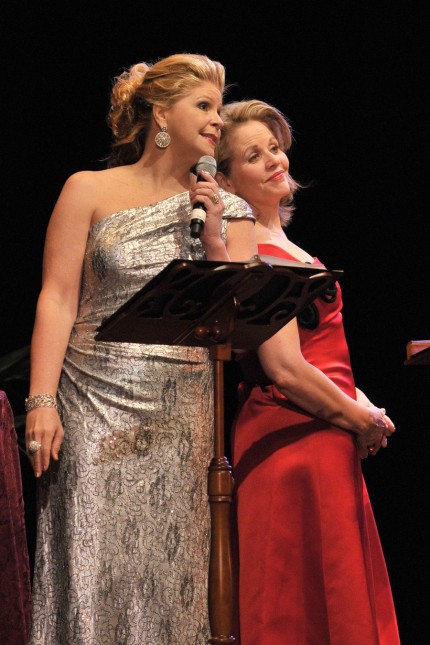Fleming and Graham charm in a relaxed afternoon of French duets and songs

Susan Graham and Renée Fleming performed a French program Sunday afternoon at Symphony Hall. File photo: Dan Rest
By their own admission during their joint recital at Symphony Hall Sunday afternoon, soprano Renée Fleming and mezzo-soprano Susan Graham have appeared together so often in opera productions that sometimes they think they have when they haven’t.
So if you’re racking your brain for details of the legendary Fleming-Graham version of Mozart’s Così fan tutte, you can relax. There never was one—an omission partially remedied at this concert (see below)—but there certainly have been plenty of other memorable moments onstage for these two artists.
So Sunday’s event, presented by Celebrity Series of Boston and attended by an enthusiastic capacity audience, presented a familiar act in an unfamiliar setting: a genteel recital of French art song.
The rather plain, Congregational stage of Symphony Hall was softened for the occasion by the addition of three Empire armchairs, vases with flowers, and two ornate wood music stands for the artists, who were decked out in a total of four splendid gowns, one each for each half of the concert. By contrast, dark-suited pianist Bradley Moore at his basic-black Steinway concert grand appeared to be a visitor from another century, if not planet.
The atmosphere became even cozier as the singers took microphones and spoke to the audience and each other between numbers, telling a bit about the composers, describing the songs, or sharing an anecdote.
For this event, both singers left their largest vocal sounds back at the opera house, focusing instead on responding intimately to the songs’ poetic texts, and blending their tones seamlessly in the duets.
Graham’s exceptionally full yet elegant voice bloomed easily in the crescendos, with plenty of power in reserve. In Fleming’s sound one was aware of the passage of years, her voice as finely phrased as ever but sometimes sounding a little dry and strained.
In their onstage conversation, Graham mentioned having first met Fleming “twenty-five years ago this month,” but tactfully avoided any of those “you were my hero” compliments. Nevertheless, when Fleming praised Graham as “my favorite interpreter of French song,” it couldn’t sound like anything but a blessing conferred.
The first half of the program consisted of duets by Saint-Saëns and Fauré, Debussy’s Clair de lune performed by pianist Moore, and Fleming in songs by Debussy and Delibes. (With apologies, the reviewer is unable to describe these performances, having arrived late at the hall.)
Graham’s solo turn came after the long intermission (and costume change), with four brief songs by Reynaldo Hahn, arranged in a sort of vocal sonata: a first movement to set the scene (Le Rossignol des lilas), a pathos-laden slow movement (Infidelité), a gossipy scherzo (Fêtes galantes), and a fleet, bubbly finale (Le Printemps).
Graham vividly inhabited each of the characters, particularly in the heartbroken Infidelité. Moore subdued the sound of his big piano with the lid wide open—more than he needed to, in fact, given Graham’s effortless projection.
However, he set the scene effectively with the dark, bubbling water figurations of Berlioz’s tragic duet La Mort d’Ophélie. Fleming and Graham told the story of Ophelia’s drowning in a rather cool paraphrase of Shakespeare, but their wordless vocalise at song’s end brought shivers of both grief and the macabre.
The atmosphere lightened considerably in the closing items, three favorite duets from light opera: the comic turn for saucy twins, “Blanche-Marie et Marie-Blanche” from Messager’s Les p’tites Michu; Offenbach’s greatest hit, the Barcarolle from Les Contes d’Hofmann;and the Flower Duet from Delibes’s Lakmé. In addition to the sensuous blend of the voices, one could enjoy the apt interpretations–humorous, melodious, and delicate, respectively.
The artists didn’t make the audience beg for encores, but returned immediately to the stage and got to work. Così fan tutte came first, as Fleming and Graham re-created the famous performance of the Act I duet “Ah guarda, sorella” that, they were surprised to learn, they had never given. Their smart, tuneful portrait of sibling rivalry proved worth waiting for.
Next up was Graham alone, doing some comic business with a cigarette (unlit) before sitting at the piano and accompanying herself in a version of La Vie en rose that started out a little campy but ended up quite affecting. Among Graham’s many talents, one must now include a flair for cocktail piano, glittering arpeggios and all. (No microphone was needed for this lounge act, despite the size of the lounge.)
Fleming and Graham returned to the stage for an exchange of compliments, some reflections on their six-city tour (of which this concert was the last), and one final encore, the evening prayer duet “Abends wenn ich schlafen geh” from Humperdinck’s Hänsel und Gretel, to float the audience out the doors and into the gathering dusk outside Symphony Hall. Clearly, these troupers hadn’t lost their timing.
The next presentation of the Celebrity Series of Boston will be Karita Mattila, soprano, and Martin Katz, piano, at Jordan Hall, Friday, 8 p.m. celebrityseries.org; (617) 482-6661.
Posted in Performances




